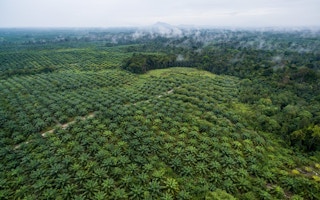A new finance scheme has launched that weaves forest conservation into the way companies buy palm oil.
Called Rimba Collective, the initiative is backed by consumer goods giants PepsiCo, Nestle, and Procter & Gamble, and palm oil trader Wilmar International. It aims to protect an initial 500,000 hectares of tropical forest in Southeast Asia, starting with Indonesia, through an estimated US$1 billion in funding for conservation projects over the next 25 years.
The larger the volume of palm oil a company buys, the more it contributes to the conservation fund. The projects the scheme will fund are billed as long-term forest conservation investments that support local communities as well as protect and restore critical habitats such as peatlands and mangroves. Payments will be made to projects based on performance, and will be third-party verified.
“The problem with conservation finance has been that it is short-term; it tends to come from corporate social responsibility (CSR) budgets, which often disappear when a market downturns. Rimba Collective provides a stable, lasting finance mechanism for conservation,” said Michal Zrust, founder and chief sustainability officer of Lestari Capital, the conservation finance firm behind the scheme.
Zrust said that the idea of the scheme is to embed conservation into the cost of goods such as palm oil, and eventually the cost of conservation projects could be integrated into procurement contracts, although doing so currently faces technical and logistical obstacles.
“
By linking conservation funding directly with company operations, it has the potential to be a game-changer for forest protection and restoration.
Michal Zrust, founder, Lestari Capital
The mechanism aims to include more corporate partners when it goes live at the end of 2021, and could potentially be applied to other forest-risk commodities such as soy, rubber, coffee and timber, said Zrust.
Rimba Collective is positioned as complementary to the US$61 billion palm oil trade’s efforts to decouple deforestation from growth. Most palm oil buyers have been unable to remove deforestation from their supply chains, despite high-profile corporates pledges to do so. Mars claimed to be deforestation-free last year, a claim that has been refuted by some green groups.
Rimba Collective allows companies to make climate, conservation and community-support claims, and aligns with firms working on recovery commitments for past deforestation, but does not allow for compensation for future deforestation, Zrust clarified.
The scheme will run alongside the Indonesian government’s “focus on protecting the country’s natural capital whilst generating resilient jobs, attracting high quality international and domestic capital, and driving economic development to recover from the Covid-19 crisis,” Rimba Collective said in a statement.
Government policies such as a ban on new oil palm plantation licenses, forest fire mitigation measures, and a social forestry programme were linked by the authorities to record-low deforestation rates in Indonesia in 2020, although wet weather, a depressed economy and lower palm oil prices have also been attributed to lower forest losses last year.
Glenn Hurowitz, founder and chief executive of environmental campaign group Mighty Earth, told Eco-Business that Rimba Collective has the potential to deliver “gigaton scale climate benefits”, but just as implementation mattered far more than corporate deforestation pledges, the same is true of conservation and restoration.
“The reality of these companies’ environmental commitments will be manifest in the quality and extent of the implementation of these plans, not the pledges on paper,” he said, adding that the companies in the Rimba Collective were “promising to actually drive positive change.”
Grant Rosoman, senior advisor, forest solutions for Greenpeace, said that while new financing mechanisms were needed for tropical forest conservation, it was critical that the projects being financed have the free and prior informed consent (FPIC) of the indigenous or local communities that inhabit the area, and that they receive benefits from the conservation.
“Any new fund or finance mechanism needs to be completely transparent on its structure and organisation, sources of funding and costs and payments, as well as maps and details of on-the-ground performance,” he said.
Rimba Collective says it will “directly benefit” 32,000 local people in forest-frontier communities through its conservation programmes.

















